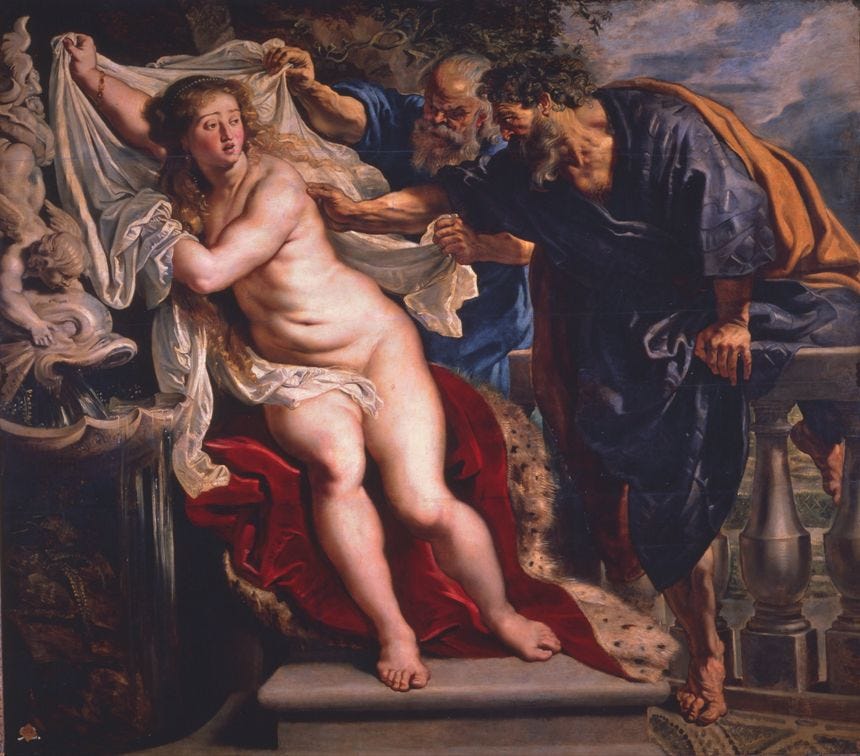The temple of the spirit is the body, not the mind.
Oh, the human mind can be a beautiful thing, but that’s as rare as grace. The happiest people only use their minds when they have to. As a general rule, the more you live in your head, the unhappier you are.
I know America never figured this out because we don’t have bathhouse culture.
My recent trip to East Asia was a godforsaken carousel of recycled air, fluorescent lightning, cramped seating, and lines. I was nauseous. My tongue was thick and furred. Errant noises made me flinch, and nothing felt real or good.
When I finally oozed into my hotel room in Osaka, I wanted to lie down much more than I wanted a bath, but there’s a specific griminess to long haul flights that feels like it’ll contaminate a bed.
Japan is known for its bathhouses. Famous onsens are radioactively heated, teeming with natural mineral waters, bejeweled with fallen citrus fruit. The hotel’s onsen was just a large, shallow pool on the top floor, softly steaming beside a line of showers. Still, it was transcendental.
Sitting down, the hot water just came up to my chin. The heat seeped into my skin like a blessing, untangling what felt like endless frayed knots in my nerves. My entire attention was on how my toes felt clenching and flexing in the steaming water. In that midnight bath I lost myself for hours in my own body, experimenting with the flexion of every muscle, reacquainting myself with my own breath.
I was not bored. I was not anxious. I was not lonely. I had no desire to look at my phone. I was fully inhabiting myself in a way I hadn’t for weeks.
Afterwards I was unbelievably, unscientifically refreshed and awake, even though I hadn’t slept in twenty-four hours. I watched the sunrise breakfasting on miso soup, rice, natto, and fermented vegetables followed by a great day exploring Osaka.
the body in culture
Wellness in America often feels like a battle against the body rather than an invitation into it. People treat their bodies like a beast to be conquered: punished with spin classes, regulated with calorie math, carefully dosed with supplements and substances.
There’s a subtle disregard for and alienation from our fundamental bodily perceptions, like our body is just machinery accompanying the all-important brain. We don’t have rituals of quietude or communal restoration. There is no appreciation or intentionality around the art of simply being.
In ancient Japan, bathhouses were often attached to temples. Cleansing the body was inseparable from cleansing the spirit. It is said that villagers watched a wounded egret heal itself by visiting the hot springs of Dōgo and so first discovered the healing powers of the onsen.
In Finland, too, the sauna has spiritual significance. Traditionally it is where babies are born and where the dying are washed one last time. They say even today that sauna is the poor man’s pharmacy: “If tar, spirits, or sauna won’t cure you, the disease is probably fatal.”
In Rome thethermae was for more than public hygiene. The Stoics believed in harmony between body and mind: bathing was part of that moral regimen. To maintain your composure in the forum, you first had to sweat in the caldarium.
We’re used to thinking of happiness as a mindset. But across cultures and centuries, it was understood more like a posture.
This publication is called observing happiness because for the longest time all I wanted was to just be happy and I didn’t know how. No one around me had especially bad lives, but clearly none of them were really happy except in rare, shining moments.
There is more wisdom in your body than in your deepest philosophy.
— Friedrich Nietzsche
A psychologist might call my natural temperament manic-depressive. My brain chemistry let met get excited and delighted very easily, but the intense highs came with intense lows and (worse) periods of gray nothingness. The rollercoaster was fun, but I had no resilience or ability to self-regulate.
Lasting contentment always felt incomprehensible. I read neuroscience books, philosophy texts, everything eloquent and sensible people had to say about it. I guess you could say it was my special interest.
I unlocked consistent, natural, effervescent happiness through the body, not the mind. The mind is a brilliant tool, but it’s often misused—overworked, under-trained, or treated as the sole site of selfhood.
I’ve realized the mind can impede happiness very well, but it can’t create it. Euphoria? Passion? Obsession? Satisfaction? Yes. But not the kind of happiness I’m talking about: simple and sustainable, a soul-deep wellspring of contentment that makes everything from friendship to work to health easier and sweeter.
It’s even how I got over my social anxiety.
(I go into how to keep your mind from making you miserable in a another essay, called happiness from the inside out).




